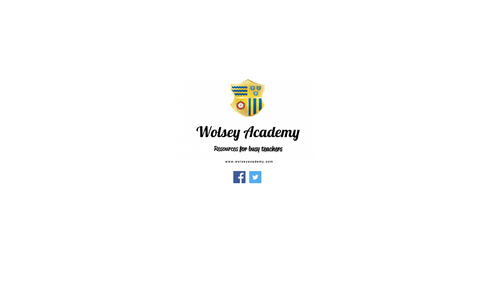

Industrial Revolution:
From a Scheme of Work on the Industrial Revolution. Target is KS3 but all assessments throughout are GCSE and use Edexcel criteria. Each lesson contains a lesson plan, quick start guide, printable resources, mini plenaries, challenge questions, mark schemes, writing frames, lots of differentiation, a nice mix of activity types and a lesson specific EAL activity sheet. There are 14 lessons in total, but each lesson has enough material to last 2 or 3 lessons for even high ability classes.
Most lessons include some high-level source analysis.
The lessons also include a link to a site hosting a self-marking End of Unit quiz and a revision guide which make for nice homework activities. The SOW has been used for several years (with continual updates and improvements) at a very successful History department in an outstanding school.
If used at KS3 it also acts as a grounding for any History of Medicine modules they might encounter at KS4 (hence the focus on public health and inventions).
The SOW covers the following topics:
- Introduction to the Industrial Revolution (free)
- Population Boom (free)
- Factories
- Coal Mining
- Transport
- Robert Stephenson
- Industrial Revolution inventors
- Child Labour
- Public Health Problems
- Public Health Solutions & Government Intervention
- Source Question on the Big Stink
- Luddites
- British Empire
- Source Question on Empire
- Revision Guide & EAL activities.
WolseyAcademy.com, a non-profit resource provider, directs all profits to various charities, including refugee support, youth sports, educational programs, and carbon capture, achieving a carbon-negative status. Explore our site for resources and free history role-playing games loved by students. Thank you for your dedication to teaching and for supporting our mission.
Hope it helps.
Get this resource as part of a bundle and save up to 77%
A bundle is a package of resources grouped together to teach a particular topic, or a series of lessons, in one place.
Social History Through the Ages - 20 lessons
A 20 lesson series that takes students through 4 time periods: Ancient (Romans), Medieval (Normans, Plantagenet), Industrial (Ind Rev) and Modern (Internet, Fashion, Sport). Each lesson is fully resourced with everything you need to teach it contained within the PowerPoint itself (no drama with dozens of word files). The lessons are as follows. 1. Roman Life in Pompeii 2. Roman Medicine and Galen 3. Norman Feudal System 4. Norman Domesday Book Analysis 5. The Medieval Church (Becket) 6. Medieval Life 7. Medieval Life Game Booklet 8. Factory Life 9. Working in a Coal Mine 10. Child Labour in the Factories 11. Public Health Problems 12. Public Health Solutions 13. Public Health Source Work 14. Political Uprisings - Luddites 15. Black History - William Cuffay 16. A History of Video Games and their impact 17. Fashion Through Time (History Club) 18. World Cup History (History Club) 19. Impact of the Internet on Society 20. Impact of the Internet of the world of Work Wolsey Academy, a non-profit resource provider, directs all profits to various charities, including refugee support, youth sports, educational programs, and carbon capture, achieving a carbon-negative status. Explore our site for resources and free history role-playing games loved by students. Thank you for your dedication to teaching and for supporting our mission. #BetterTeachingBetterPlanet Hope it helps.
Industrial Revolution
Industrial Revolution: A Wolsey Academy Scheme of Work on the Industrial Revolution. Target is KS3 but all assessments throughout are GCSE and use Edexcel criteria. Each lesson contains a lesson plan, quick start guide, printable resources, mini plenaries, challenge questions, mark schemes, writing frames, lots of differentiation, a nice mix of activity types and a lesson specific EAL activity sheet. There are 14 lessons in total, but each lesson has enough material to last 2 or 3 lessons for even high ability classes. Most lessons include some high-level source analysis. The lessons also include a link to a site hosting a self-marking End of Unit quiz and a revision guide which make for nice homework activities. The SOW has been used for several years (with continual updates and improvements) at a very successful History department in an outstanding school. If used at KS3 it also acts as a grounding for any History of Medicine modules they might encounter at KS4 (hence the focus on public health and inventions). The SOW covers the following topics: 1. Introduction to the Industrial Revolution (free) 2. Population Boom (free) 3. Factories 4. Coal Mining 5. Transport 6. Robert Stephenson 7. Industrial Revolution inventors 8. Child Labour 9. Public Health Problems 10. Public Health Solutions & Government Intervention 11. Source Question on the Big Stink 12. Luddites 13. British Empire 14. Source Question on Empire 15. William Cuffay & The Chartists (Black History Month lesson) 16. Causes of Indian Independence 17. All Guided Reading Challenges (24 in total - 6 of which directly relevant to the Industrial Revolution & Empire) Wolsey Academy, a non-profit resource provider, directs all profits to various charities, including refugee support, youth sports, educational programs, and carbon capture, achieving a carbon-negative status. Explore our site for resources and free history role-playing games loved by students. Thank you for your dedication to teaching and for supporting our mission. Hope it helps.
Something went wrong, please try again later.
This resource hasn't been reviewed yet
To ensure quality for our reviews, only customers who have purchased this resource can review it
Report this resourceto let us know if it violates our terms and conditions.
Our customer service team will review your report and will be in touch.